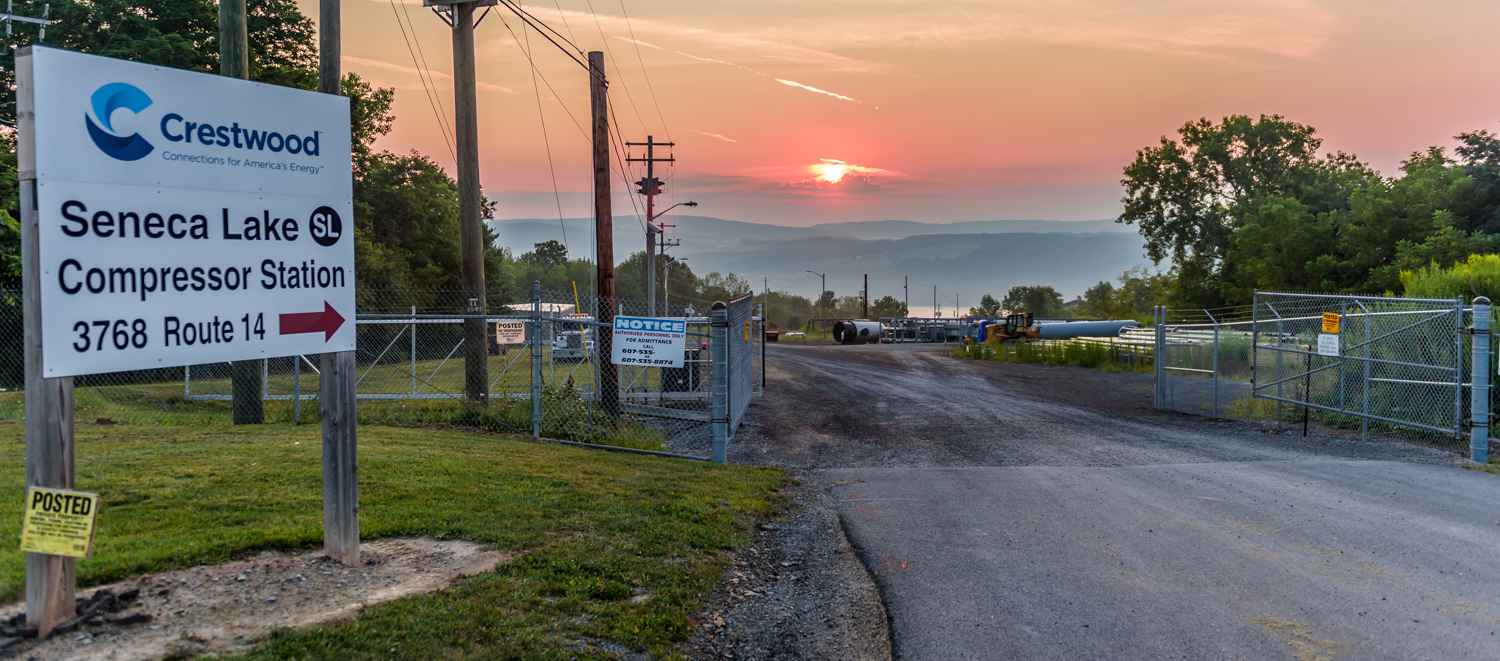At a pipeline industry conference in Pittsburgh on January 31, Robert G. Phillips, CEO and President of Crestwood Equity Partners, offered an unusually candid perspective on pipelines, fracking, environmental regulations, and how industry plans to fight back against public opposition and permitting problems.
This past May, Crestwood announced that it was halting plans for a natural gas storage facility in the Finger Lakes region of New York following a three-year civil disobedience campaign by grassroots activists and environmentalists who feared contamination of Seneca Lake, which supplies drinking water to roughly 100,000 New Yorkers. But as Phillips told the conference, the company isn’t backing off for good.
“Now, this is hand-to-hand combat in this region,” Phillips told the crowd of oil and gas company representatives at the pipeline conference, dubbed Marcellus Midstream 2018.
“We have to be ninja-like,” Phillips said, in recommendation to his industry colleagues. “The owners and the contractors have to work together not just to get it done on-budget, on-time, but to get it done quietly, softly, as least-disruptively as possible.”
Crestwood certainly encountered a different type of disruption in New York. There, over 400 people, including Ithaca College scholar Sandra Steingraber, local business owners, and religious leaders, were arrested for trespass or disorderly conduct outside Crestwood’s Gallery 2 Expansion project, where the company still hopes to store up to 2.1 million barrels of liquid fossil fuels in salt caverns under Seneca Lake, according to the grassroots campaign We Are Seneca Lake.
Crestwood Equity Partners, a master limited partnership which merged with Inergy in 2013, currently uses truck and rail to transport propane and other liquid fossil fuels, but, Phillips explained, the company would rather be able to ship by pipeline. Some of the company’s plans in New York state, however, hit strong public opposition.
“And the regional response was very, very negative in the Seneca Lakes region,” Phillips said. “Well, New York as you know is totally opposed to fracking. So they throw pipelines and infrastructure and everything else to get fossil fuel to market into the same basket as fracking.”
The fossil fuel involved in Crestwood’s plans would primarily come from the Marcellus shale, meaning that it would be produced using hydraulic fracturing, or fracking, which the Environmental Protection Agency (EPA) in 2016 found has contaminated some of America’s drinking water supplies. The EPA discovered evidence of contamination not only during the actual fracking process, but also during drilling, shipment, waste-handling, and other stages of producing shale gas.
Environmentalists are also concerned by the industry’s air pollution, which some scientists warn is so severe that burning natural gas to produce electricity can be significantly worse for the climate than burning coal (others say more research is needed to confirm exactly how much gas is leaking). High levels of methane leaks have been documented during fracking and drilling, and also while gas is transported by pipeline or stored underground.
Not Giving Up
At the Marcellus Midstream conference, Phillips called the natural gas liquids industry, which trades in propane, butane, ethane, and other fossil fuels produced by Marcellus shale wells, “a literally cradle to grave business” — apparently referring not to the health risks associated with oil and gas development, but to Crestwood’s wellhead-to-burner business model.
While that was perhaps an unfortunate turn of phrase, Phillips had a clear message for the industry about Crestwood’s plans for Seneca Lake. In the fall, Crestwood divested itself of a salt mining business near Seneca Lake that would have complemented its propane storage business, which some observers read as a step toward pulling out of the area entirely.
“We’re not giving up,” Phillips said at Marcellus Midstream 2018. “I had a chance when I sold my salt business in New York in December, I sold that for $225 million. I had a chance to walk away from the propane storage project and the permit. I didn’t do it. I kept the permit. I’m gonna keep it for years. And we’re gonna keep just plodding along. And eventually we think economics will dictate a changing approach by the regulators or the governor in New York.”
Asked whether Crestwood had a permit for its project, New York state officials said “The New York State Department of Environmental Conservation (DEC) has not made a final determination whether to permit the underground liquefied petroleum gas storage project proposed by Finger Lakes LPG Storage, LLC.” Gas Free Seneca is involved in a legal appeal related to that permit process, a DEC spokesperson said.
Local opponents say that the issue isn’t who the governor is, but rather the public sentiment in the region that runs strongly against Crestwood’s plans.
“It should be clear to any prudent person that this is a bad idea, in the wrong place,” said Will Ouweleen, a member of Gas Free Seneca who runs a Finger Lakes winery. He cites potential impacts to the region’s $4 billion wine tourism if an accident occurred near the lake.
“It begs to leak,” Ouweleen said about Crestwood’s plan to store propane below Seneca Lake. “There’s lots of wells drilled all over the area that are not mapped.”
Those wells and any natural fissures could provide a path for propane stored underground to escape. Crestwood’s propane plans have stalled as regulators assess how the project would impact the surrounding areas.
“These regulatory agencies or even local ones have enormous leverage over the industry right now,” Phillips explained during a question and answer session later, responding to a query about the Army Corps of Engineers and other federal, state, and county regulators.
But, Phillips said, he planned to learn from the experience of older, more established companies in the region. He cited Crestwood’s 50-50 partnership with utility company Consolidated Edison (Con Ed) at the Stagecoach natural gas storage and pipeline hub in southern New York and northern Pennsylvania.
“Do it the Con Ed way,” he said, “which we believe is make a lot of friends and be ready to move forward in an appropriate way when you see that opening.”
One key to that strategy, he said, was reducing the industry’s “footprint” and getting an environmental message out to the public, by working together with big green environmental groups where possible. “Do a better job in the projects that we are building, get those done in ninja-like fashion so it’s not disruptive, and it’s environmentally — environmentally-friendly.”
“You can build a pipeline in an environmentally-friendly way,” he continued. “You absolutely can do it.”
Industry to Regulators: ‘Just Lay Down and Approve Every Pipeline’
At the industry conference, Phillips described a dinner conversation he’d had the night before with officials from Marathon Pipe Line, Energy Transfer Partners (the builder of the Dakota Access pipeline, or DAPL), and other pipeline companies, hosted by conference organizers. “I’m certain if they just take our advice, the regulators will just lay down and approve every pipeline project,” Phillips said.
At dinner, they’d discussed how to solve the industry’s problems, Phillips said. “Chris, I hope you didn’t have a tape recording going because I think we made some pretty controversial and bold statements,” he said.
According to Phillips, they discussed the public opposition that has caused serious headaches for pipeline builders in the past several years. “The ETP [Energy Transfer Partners] guy of course set the standard for that,” he said, “with DAPL and what’s going on at DAPL and what’s going on at Rover.”
The dinner gathering reflects a striking level of collegiality between nominal competitors in the oil and gas industry, which Phillips described at the conference as “tough” and “competitive” — despite the markedly different tone of the dinner.
“It takes a village,” Phillips told those gathered at Marcellus Midstream 2018, “not only to put on a conference like this but to continue to drive success throughout this great basin.”
No Rules
During his question and answer session at Marcellus Midstream, Phillips recalled the early days of the oil and gas industry, before America’s cornerstone environmental laws such as the Clean Water Act, the Clean Air Act, the National Environmental Policy Act, and the Safe Drinking Water Act.
“This is my 41st year in the business so I started in the 70s,” he said. “We didn’t have any rules back then. In Texas, you could lay a pipeline anywhere, you didn’t even have to get a permit, right?”
Things have changed now, he said. “This is a much more focused industry on doing things the right way,” he said, “because we have to.”
“I wouldn’t begin to tell you how much money I spend on regulatory compliance, it would boggle your mind,” he added.
These days, however, the Trump Environmental Protection Agency (EPA), which enforces those federal laws, has a much different mentality about enforcement and oversight than prior administrations.
“We have, by the way, seen for those of you that care, since Trump went into the White House and Pruitt went in to the EPA, we have seen a real measurable improvement in the industry’s relationship with the EPA, with the EPA lessening or rightening their regulatory oversight on projects and operations,” Phillips said.
On natural gas pipelines, Phillips also predicted a fight in the region for years to come and that more construction should be expected. “We believe most of those [pipeline] projects will largely fill up within the next three years,” he said, “therefore, we may be right back here two to three years from now needing more projects to drive more supply and development.”
‘We Live on Volatility’
One key to getting the public on the industry’s side, Phillips predicted, would be to turn the price volatility that the natural gas market is infamous for into a positive for the industry, by making the case that if there were more pipelines and gas storage facilities, customers would face fewer price spikes like the ones that hit New England during the polar vortex this year.
After this year’s winter price spikes were over, he said, “all the trade associations that we’re members of, both gas and propane, will make strong cases in all the local and regional jurisdictions to the right people … and that’s exactly what they’ll promote: if we had more pipeline, if we had more storage capacity, we could have done down the impact on the public for those gas prices and propane prices.”
That’s a tricky talking point for Crestwood, however, because part of Crestwood’s business model depends on those price spikes, as Phillips had earlier explained during his remarks.
“And being in the storage business and owning [half of an existing Pennsylvania storage site], we live on volatility,” he said, describing how this year, his company could sell natural gas going into storage for about $5.50 per thousand cubic feet more than it cost to buy — as a result of exactly those price swings. “We,” he added, “predict more volatility.”
* Update 2/15/2018: This piece has been updated to include comments by the New York Department of Environmental Conservation related to the storage project permit status.
Main image: Crestwood’s methane gas storage expansion project was approved by the Federal Energy Regulatory Commission in 2014. Credit: Erik McGregor ©2015, Used with permission
Subscribe to our newsletter
Stay up to date with DeSmog news and alerts






